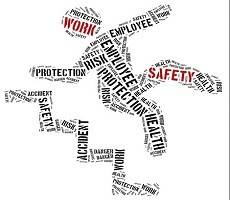August 24, 2016
Nearly three quarters of UK staff say their workplace is a health hazard 0
 Personal injury lawyers may have helped fuel the UK’s overzealous health and safety culture, but the truth is that their services are often called for to challenge negligent employers. Now a new piece of research by Hayward Baker claims that many employees are not only stuck in unsafe workplaces but with unsanitary working conditions, which is putting their health at risk. The research into over a thousand workers on the conditions of Britain’s offices, shops, factories, warehouses and building sites found that 69 percent believe their workplace to be a health hazard. The study revealed 35 percent of working Brits have picked up an illness from their place of work – with 18 percent claiming to have been struck down with food poisoning or caught a stomach bug because of dirty conditions. A further 39 percent have suffered an injury at work – with two in ten (20 percent) having been to hospital due to a work-related illness or injury.
Personal injury lawyers may have helped fuel the UK’s overzealous health and safety culture, but the truth is that their services are often called for to challenge negligent employers. Now a new piece of research by Hayward Baker claims that many employees are not only stuck in unsafe workplaces but with unsanitary working conditions, which is putting their health at risk. The research into over a thousand workers on the conditions of Britain’s offices, shops, factories, warehouses and building sites found that 69 percent believe their workplace to be a health hazard. The study revealed 35 percent of working Brits have picked up an illness from their place of work – with 18 percent claiming to have been struck down with food poisoning or caught a stomach bug because of dirty conditions. A further 39 percent have suffered an injury at work – with two in ten (20 percent) having been to hospital due to a work-related illness or injury.






 A series of reports published in the past few days highlight the challenges faced by Britain’s disabled workers. The studies claim separately that disabled workers are keen to work but are less likely to be in employment and may be hiding disabilities from employers, are paid less when they are in work and that many employers do not feel they are well equipped to deal with the needs of disabled staff. The first study from Reed in Partnership and Disability Rights UK found that one in ten employers do not feel able to support a disabled employee. Meanwhile research from the Equality and Human Rights Commission (EHRC) found that employees who experience mental ill-health earn up to 42 per cent less than colleagues. A third report from Citizen’s Advice found that 40 percent of disabled people would like to work but can’t find a job. And finally a report from RIDI claims that many people applying for jobs may be hiding their disability from employers.
A series of reports published in the past few days highlight the challenges faced by Britain’s disabled workers. The studies claim separately that disabled workers are keen to work but are less likely to be in employment and may be hiding disabilities from employers, are paid less when they are in work and that many employers do not feel they are well equipped to deal with the needs of disabled staff. The first study from Reed in Partnership and Disability Rights UK found that one in ten employers do not feel able to support a disabled employee. Meanwhile research from the Equality and Human Rights Commission (EHRC) found that employees who experience mental ill-health earn up to 42 per cent less than colleagues. A third report from Citizen’s Advice found that 40 percent of disabled people would like to work but can’t find a job. And finally a report from RIDI claims that many people applying for jobs may be hiding their disability from employers.




 For all that everybody bangs on about Millennials, it’s increasingly apparent that the workforce in most nations is actually getting older and that it’s not just Governments who are keen to keep older staff in work, but also people themselves. A new study from MetLife based on
For all that everybody bangs on about Millennials, it’s increasingly apparent that the workforce in most nations is actually getting older and that it’s not just Governments who are keen to keep older staff in work, but also people themselves. A new study from MetLife based on 




 A coalition of twenty major European telecommunications firms has come together to drive the rapid creation of a continent wide 5G network and warn national Governments and the EU of the dangers of over-regulation. The seven page document entitled the
A coalition of twenty major European telecommunications firms has come together to drive the rapid creation of a continent wide 5G network and warn national Governments and the EU of the dangers of over-regulation. The seven page document entitled the 

















July 5, 2016
Sea and space: the final frontiers for remote working and connectivity 0
by Neil Franklin • Case studies, Comment, Knowledge, Legal news, Technology
More →